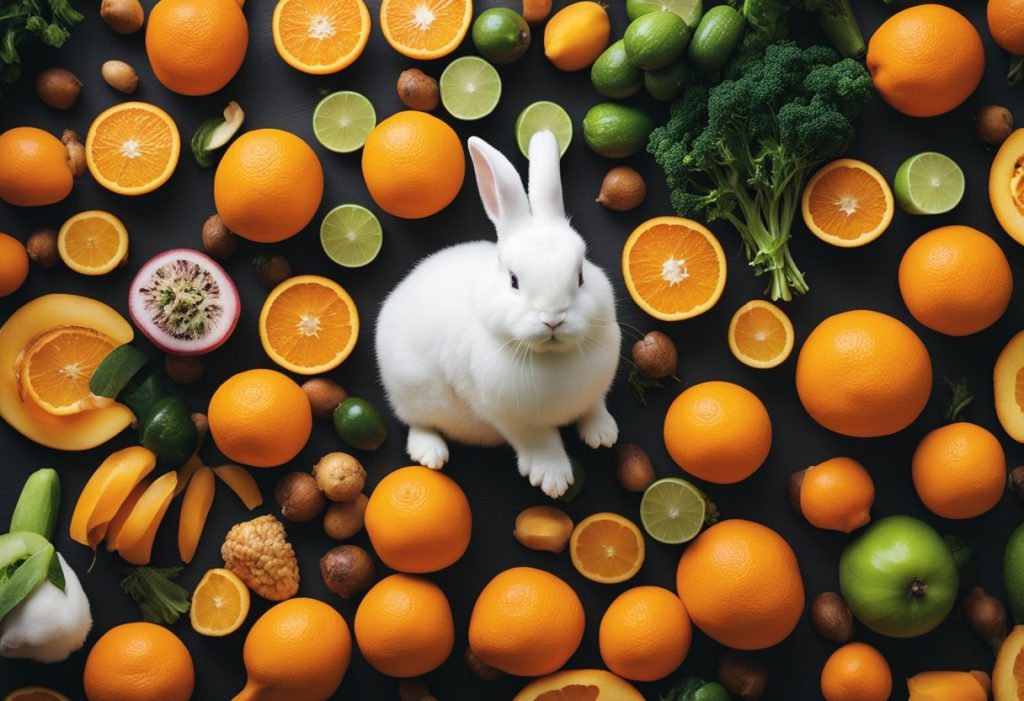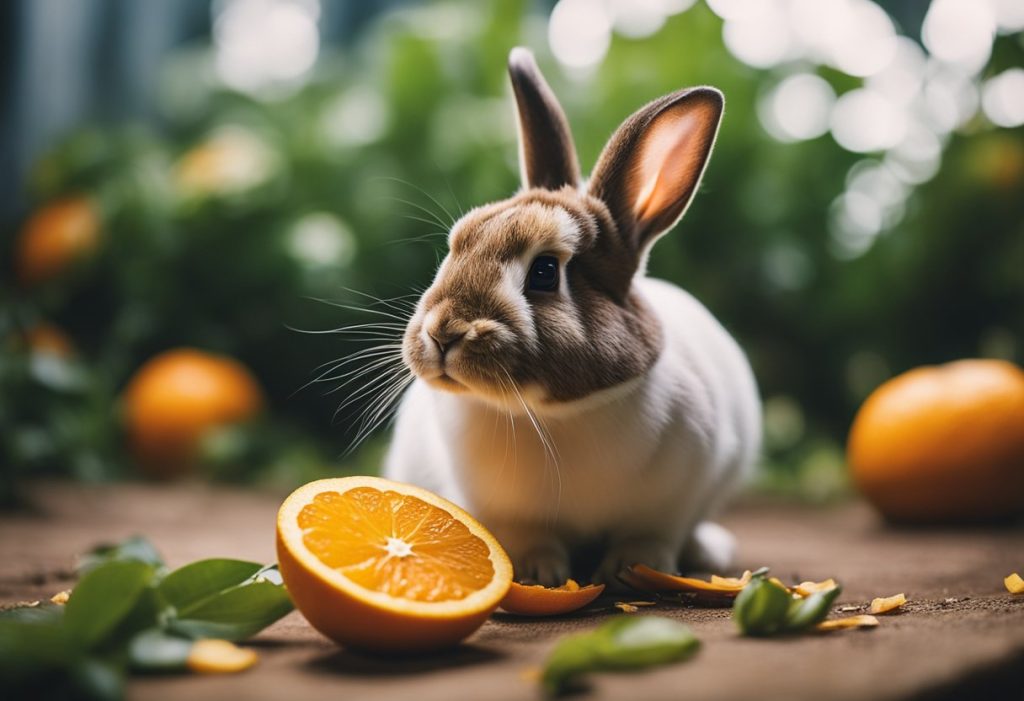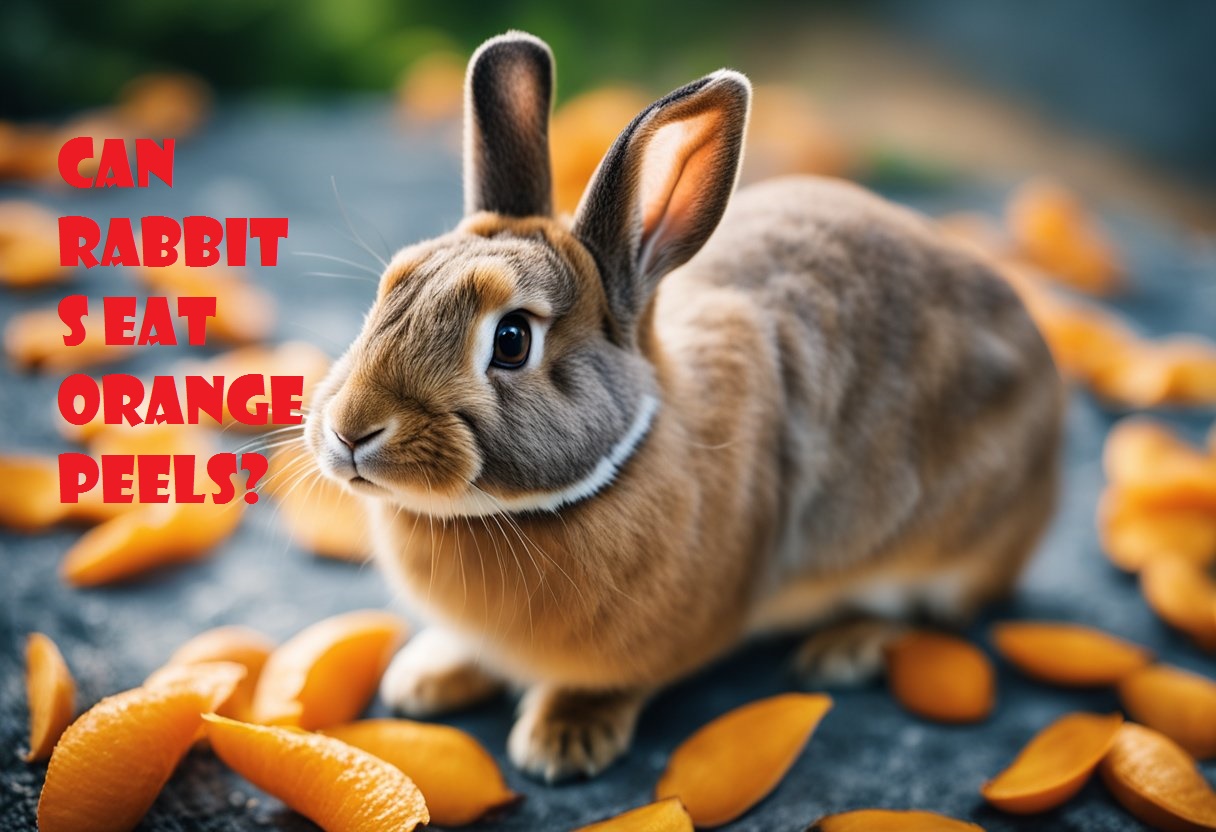Rabbits are known to be herbivorous animals and love to munch on fruits and vegetables. However, not all fruits and vegetables are safe for them to consume. One such example is oranges. While rabbits can eat oranges, the question arises: can rabbits eat orange peels?
Orange peels are a rich source of vitamin C, which is essential for a rabbit’s overall health. However, before feeding your rabbit orange peels, it’s important to understand its associated risks. Orange peels contain a high amount of fibre, which can be difficult for rabbits to digest. Additionally, the high sugar content in oranges can lead to obesity and dental problems in rabbits if given in excess.
Overall, monitoring your rabbit’s diet is important and ensures they get balanced nutrients. While rabbits can eat orange peels, it’s important to do so in moderation and only after consulting with a veterinarian. In the following sections, we’ll explore in more detail whether rabbits can eat orange peels and provide a comprehensive guide on safely introducing orange peels into your rabbit’s diet.
Can Rabbits Eat Oranges Peels?
Rabbits can safely consume orange peels. Orange peels contain vitamin C, essential for rabbits as they cannot produce it themselves. However, orange peels should be given in moderation, as too much citrus can upset a rabbit’s digestive system. It is also important to ensure that the orange peels are washed thoroughly to remove pesticides or other chemicals.
If you notice any signs of digestive upset, such as diarrhea or changes in behavior, it’s advisable to limit or discontinue offering orange peels. Always wash the orange peel thoroughly to remove any pesticides or residues, and provide small, bite-sized pieces to prevent choking.

Understanding Rabbit Nutrition
Rabbits are herbivores and require a diet high in fibre and low in fat to maintain optimal health. Understanding the essential nutrients for rabbits and the basics of their diet is crucial for providing them with a balanced and healthy diet.
Essential Nutrients for Rabbits
Rabbits require a variety of nutrients to maintain good health. These include:
- Fiber: Rabbits need a high-fiber diet to maintain good digestive health. Fiber helps to keep their digestive system moving and prevents blockages. Hay is an essential source of fibre for rabbits and should make up most of their diet.
- Protein: Protein is important for muscle growth and repair. However, rabbits have a lower protein requirement than other animals, and too much protein can harm their health.
- Vitamins and minerals: Rabbits require a range of vitamins and minerals, including vitamin C, A, calcium, and phosphorus. These nutrients are essential for maintaining good health and preventing disease.
Rabbit Diet Basics
A healthy rabbit diet should consist of the following:
- Hay: Hay should make up the majority of a rabbit’s diet. It provides essential fibre and helps to keep their digestive system healthy. Timothy hay is good for adult rabbits, while alfalfa hay is suitable for young, pregnant, or nursing rabbits.
- Fresh vegetables: Fresh vegetables should comprise a small portion of a rabbit’s diet. Leafy greens such as kale, spinach, and parsley are good choices. Carrots, bell peppers, and cucumbers can also be given in moderation.
- Pellets: Pellets are a good source of protein and other essential nutrients. However, they should be given in moderation, as too many pellets can lead to obesity and other health problems.
- Water: Fresh, clean water should always be available to rabbits.
The Safety of Citrus for Rabbits
Rabbits are herbivores and can eat a variety of fruits and vegetables. However, not all fruits and vegetables are safe for them to consume, including citrus fruits. While some pet owners may wonder if their rabbits can eat orange peels, it is important to understand the potential risks associated with feeding citrus fruits to rabbits.
Potential Risks of Citrus Fruits
While there is no hard evidence that orange peels harm rabbits, some pet owners prefer to serve their rabbits the soft white layer under the skin, citrus fruits, including oranges, lemons, and grapefruits, contain high levels of citric acid, which can cause digestive upset in rabbits.
Ingesting large amounts of citrus fruits can also lead to diarrhoea, vomiting, and dehydration. Additionally, the high sugar content in citrus fruits can lead to obesity and dental problems in rabbits.
Toxicity Concerns
Some pet owners may also be concerned about the toxicity of citrus fruits for rabbits. While orange peels are not toxic to rabbits, the essential oils present in them can harm their digestive systems. Ingesting too much of the essential oils can cause digestive upset and potentially more serious health problems.
It is important to note that rabbits have sensitive digestive systems and can develop health problems quickly. Therefore, it is best to avoid feeding citrus fruits to rabbits altogether. Instead, pet owners should focus on providing their rabbits with a balanced diet of hay, fresh vegetables, and a limited amount of fruit as a treat.
In conclusion, while rabbits can consume orange peels safely, it is important to understand the potential risks associated with feeding citrus fruits to rabbits. Pet owners should avoid feeding citrus fruits to their rabbits and instead focus on providing them with a balanced diet of hay, fresh vegetables, and a limited amount of fruit as a treat.

Benefits of Orange Peels for Rabbits
Rabbits are herbivores and need a balanced diet to stay healthy. While hay and leafy greens are the mainstay of their diet, rabbits can also eat fruits in moderation, including oranges. But what about orange peels? Can rabbits eat them, too? The answer is yes: rabbits can eat orange peels, which has several benefits.
Nutritional Value of Orange Peels
Orange peels are rich in essential nutrients for a rabbit’s health. According to Rabbit Insider, orange peels contain high levels of vitamin C, which is important for maintaining a healthy immune system. They also have vitamin A, which is essential for good vision and healthy skin.
In addition to vitamins, orange peels are also a good source of fibre. Fibre is important for maintaining a healthy digestive system in rabbits. A diet that lacks fibre can cause digestive problems such as diarrhoea, constipation, and bloating. Feeding orange peels can help prevent these problems and keep your pet rabbit healthy.
Digestive Health Benefits
Orange peels contain essential oils that can help promote good digestive health in rabbits. According to Squeaks and Nibbles, these oils can help stimulate the digestive system and prevent the buildup of harmful bacteria in the gut. This can help prevent digestive problems such as bloating and diarrhoea.
It is important to note that while orange peels can benefit rabbits, they should only be served as a small treat to accompany a wide selection of leafy green veggies and fresh hay. Not all rabbits will enjoy the taste of orange peels, especially if the fruit’s flesh is available. The peels will be less sweet than the fruit itself.
In summary, orange peels can be a healthy addition to a rabbit’s diet but should be served in moderation. They are a good source of vitamins and fibre and can help promote good digestive health in rabbits.
Feeding Guidelines for Orange Peels
Rabbits love to eat fruits, and oranges are one of their favourites. But can rabbits eat orange peels? The answer is yes; rabbits can eat orange peels safely. The soft white layer under the skin is the most nutritious part of the orange peel, and it is safe for rabbits to consume. However, there are a few guidelines that rabbit owners should follow when feeding orange peels to their pets.
Appropriate Portions
Rabbits have a sensitive digestive system, and overfeeding them can lead to health problems. Therefore, it is important to give them appropriate portions of orange peels. A small slice of orange peel, about the size of a thumb, is enough for a single serving. Too much orange peel can cause digestive issues like diarrhoea or bloating.
Frequency of Feeding
Feeding orange peels to rabbits should be done in moderation. Orange peels should be considered a treat, not a regular part of their diet. It is recommended to feed them orange peels once or twice a week. Overfeeding them with orange peels can cause health problems, such as obesity or dental issues.
In conclusion, rabbits can eat orange peels safely, but following the appropriate feeding guidelines is important. Giving them small portions of orange peels once or twice a week can provide them with essential vitamins and minerals. However, overfeeding them can cause health problems, so it is important to be mindful of their portions and feeding frequency.
Preparing Orange Peels for Rabbits
Rabbits can safely eat orange peels, but it is important to prepare them properly to avoid any potential risks. This section will provide some guidelines on preparing orange peels for rabbits.
Washing and Cleaning
Before feeding rabbits orange peels, washing and cleaning them thoroughly is important. This is to remove any dirt, pesticides, or other harmful substances that may be present on the peel. The best way to do this is to rinse the peels under cold water and scrub them gently with a vegetable brush. If the peels are not organic, peeling off the outer layer is recommended to avoid any chemical residues.
Safe Cutting Techniques
When cutting orange peels, using safe techniques to avoid choking hazards is important. The peels should be cut into small, bite-sized pieces that are easy for rabbits to chew and swallow. Removing any seeds or tough parts of the peel is also important, as these can be difficult for rabbits to digest.
One way to prepare orange peels for rabbits is to cut them into thin strips and then dry them in a dehydrator. This makes them easier to store and can also help to preserve their nutritional value. Another option is to mix them with other fruits and vegetables to create a healthy and balanced diet for your rabbit.
Preparing orange peels for rabbits is a simple process requiring basic knowledge and care. Following these guidelines ensures that your rabbit enjoys a healthy and nutritious diet that includes various foods.
Alternatives to Orange Peels
When it comes to treating your rabbit, there are plenty of alternatives to orange peels that can provide a nutritious and healthy snack. Here are some options:
Healthier Treat Options
Rabbits love treats, but it’s important to choose healthy options that won’t harm their digestive system. Some good alternatives to orange peels include:
- Carrots: Carrots are a great source of vitamin A and can be given to rabbits in moderation as a treat.
- Apples: Apples are high in fibre and vitamin C, making them a great option for rabbits. Remove the seeds and core before feeding them to your pet.
- Blueberries: Blueberries are packed with antioxidants and can be given to rabbits as a treat.
Recommended Fruits and Vegetables
In addition to the options listed above, there are plenty of other fruits and vegetables that rabbits can safely enjoy. Here are a few recommendations:
- Kale: Kale is a great source of fibre and vitamin C. It can be fed to rabbits in moderation as a treat.
- Broccoli: Broccoli is high in fibre and vitamin C, making it a great option for rabbits. Be sure to feed it in moderation, as too much can cause gas and bloating.
- Strawberries: Strawberries are a good source of vitamin C and can be given to rabbits as a treat. Be sure to remove the stems before feeding them to your pet.
It’s important to remember that treats should only make up a small portion of your rabbit’s diet. The majority of their diet should consist of hay, fresh vegetables, and a small amount of pellets. By choosing healthy treats and feeding them in moderation, you can help keep your rabbit happy and healthy.
FAQs
Can rabbits eat orange peels?
While rabbits can eat small amounts of orange peels in moderation, limiting the quantity is crucial. Orange peels are high in fibre and can be a tasty treat for rabbits, but excessive consumption may lead to digestive issues. Always introduce new foods gradually and observe your rabbit’s response.
Are there any nutritional benefits to feeding rabbits orange peels?
Yes, orange peels contain some nutrients and fibre that can benefit rabbits. However, they should be considered a treat rather than a staple in their diet. The key is moderation, as too much can lead to gastrointestinal upset.
Can rabbits eat citrus fruits other than oranges?
Citrus fruits, including oranges, should be given to rabbits in moderation. The acidity of citrus fruits can be a concern for some rabbits and may lead to stomach discomfort. A diverse diet, including vegetables and fruits, should ensure well-balanced nutrition.
How should orange peels be prepared for rabbits?
Wash the orange peel thoroughly to remove any pesticides or residues. Offering small, bite-sized pieces is recommended to prevent choking and make it easier for your rabbit to eat. Remove any seeds and offer the peel in moderation as part of a balanced diet.
Are there any rabbits that should avoid orange peels entirely?
Some rabbits may be more sensitive to new foods, including orange peels. If your rabbit has a history of digestive issues or if you’re introducing orange peels, monitor their reaction closely. If you notice any signs of discomfort, such as changes in behaviour or digestion, it’s best to consult a veterinarian and reconsider including orange peels in your diet.
Read More Related Post:https://petsapex.com/can-rabbits-eat-watermelon/
https://petsapex.com/can-rabbits-eat-oranges/
Conclusion
While rabbits can eat small amounts of orange peels, including them in their regular diet is generally not recommended. Orange peels are high in citrus oils and acidity, which can be harsh on a rabbit’s sensitive digestive system. Feeding rabbits large quantities of orange peels may lead to digestive upset, diarrhoea, or other health issues.
If you offer a small piece of orange peel to your rabbit as an occasional treat, ensure it’s thoroughly washed to remove any pesticides or residues. Always introduce new foods slowly and in moderation to observe how your rabbit reacts. Remember that most of a rabbit’s diet should consist of hay, fresh vegetables, and a small amount of pellets. Consult a veterinarian for personalized advice on your rabbit’s diet and nutrition.

